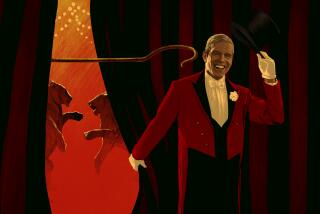On the Kazakhstan express
- Share via
IN more ways than one, the guerrilla operation that is “Borat” is premised on the ignorance of Sacha Baron Cohen’s so-called victims. There will never be another Borat film, at least not another one like this: The movie’s stratospheric profile means the supply of unsuspecting dupes has surely dwindled (and it’s doubtful if the comedian will even be able to pull off Borat-worthy maneuvers with his next movie, to be constructed around another persona, Austrian fashionista Bruno).
“Borat: Cultural Learnings of America for Make Benefit Glorious Nation of Kazakhstan” may be an unrepeatable stunt, but what’s surprising about the movie, out on DVD Tuesday, is how well it holds up to a repeat viewing.
While “Borat” is not quite as convulsively funny the second time around, its anarchic fury is no less exciting, and it remains perhaps the thorniest and strangest political provocation to have been unleashed on the American masses in recent memory: “Democracy in America” in the spirit of “Jackass” and for the age of YouTube. When it premiered last fall at the Toronto International Film Festival, audience laughter practically drowned out the screenings. By the time it opened a few months later, with word of mouth at deafening levels, a backlash was inevitable.
The detractors had two main complaints: duplicity and cruelty. Both seem to miss the point. The former charge is especially irrelevant since the film’s hybrid nature, instead of compromising its integrity, actually enhances its complexity. “Borat” may center on a fictitious character, but no one can deny its documentary aspects.
Does it matter that Borat is a fake if the attitudes Baron Cohen is exposing -- racism, sexism, homophobia, xenophobia -- are unmistakably real? (Even less pertinent, and more disingenuous, is the grievance that the filmmakers had conned some of the participants into thinking that their antics would be seen only by the television viewers of a remote nation.)
Those who have accused Baron Cohen of cruelty fault him for exploiting the goodwill and generosity of those he encountered: the frat boys who gave him a ride, the Southerners who invited him into their home, the Pentecostal churchgoers who embraced him as one of their own. There’s a whiff of hypocrisy to this charge, which incongruously echoes the cries of voyeurism and exploitation sometimes directed at ethnographic documentaries.
Baron Cohen may be setting a trap for his subjects, but he’s less coercive than his critics imply -- if all it takes for these fools to admit to their virulent prejudices is a fellow bigot with a funny accent, well, they’re certainly fair game. And as Borat himself demonstrates, it’s entirely possible to appear decent, even likable, and harbor the most contemptible views.
To be sure, there are moments of gratuitous meanness (the arbitrary jab at a dinner guest’s appearance, for instance), but for the most part Baron Cohen is a man on a mission. Many of his attacks are pointed and purposeful. The antique shop where he stumbles about smashing into merchandise is a ghastly trove of Confederate paraphernalia -- which makes the sequence not just hilarious but also cathartic.
Not nearly enough commentators have pointed out that what brings the dinner party (on Secession Drive) to a crashing halt is not the bag of feces that Borat brings back to the table but the African American prostitute he invites to this genteel little gathering.
Propitiously released a few days before the election last fall, “Borat” is a bracing political satire and polemic, one that acknowledges anger and incredulity as valid responses to the state of early 21st century America. Its vulgarity is an index of its urgency.
It’s not a nice film, but as Baron Cohen sees it, it’s not a time for niceties. Its admirers and detractors have argued that “Borat” is the movie our degraded culture deserves. More to the point, it’s the movie our desperate times demand.
More to Read
Only good movies
Get the Indie Focus newsletter, Mark Olsen's weekly guide to the world of cinema.
You may occasionally receive promotional content from the Los Angeles Times.









